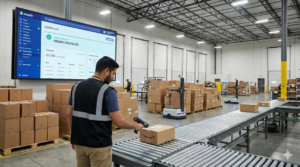Sometimes doing things yourself to save a few dollars or to keep your fingers on the pulse of your business makes sense, and running an ecommerce store entirely by yourself or with your team may seem like the right idea. However, for tasks involving your logistics and order fulfillment, it can be hard to scale to keep up with increased demand as you grow.
At some point, you may find that fulfilling orders yourself either out of your home or using some small warehouse space has gone from a simple process that is saving you some money to an unorganized full-time job on its own.
How can you be sure when to keep fulfillment in-house and when it is time to outsource fulfillment?
In this article we will cover some of the challenges you may face in scaling your in-house order fulfillment, when in-house fulfillment makes sense, and the pros and cons of in-house order fulfillment versus outsourcing order fulfillment.
What is In-House Fulfillment?
Simply put, in-house order fulfillment is when a business manages all aspects of its order fulfillment process including inventory management and ordering, picking, packing, shipping orders, and handling returns and reshipments.
Challenges With In-House Order Fulfillment
When you are first starting a business it may make sense to handle customer orders in house, but as you grow it can become challenging to scale effectively. Here are a few of the common issues you may encounter:
Slower Order Processing and Delivery Times
If you get a rush of orders or a sustained increase in demand, relying on just yourself or your team to fulfill orders can lead to delivery delays. You may find yourself having to pay overtime or spending a lot more of your own free time (or time you should be spending focusing on other areas of your business) fulfilling orders.
The worst part is the impact slower order processing can have on your customers and their impression of your brand. Lower customer satisfaction and slower than expected deliveries can lead to disappointing reviews and a decrease in repeat customers.
You will likely also see an uptick in the number of customer support requests you will have to handle as more and more customers start inquiring about the status of their orders.
Order Inaccuracies
In many ways, this can go hand-in-hand with the above situation. If you are receiving an influx of orders that is putting a strain on your order fulfillment processes, there will likely be an uptick in order errors.
Customers may receive the wrong items or find items they ordered missing. Packages might get shipped to the wrong place. These errors lead to additional time spent with customer support requests and needing to reship orders, putting even more strain on your order fulfillment process.
Running Out of Storage Space
This is a common problem for many ecommerce businesses. As your business grows, you need to expand your storage capacity. Leasing warehouses can be an effective solution, but that comes with additional expenses and its own challenge.
One of those challenges being how big of a space to lease? If you go too big, you will be paying for a lot of extra space you do not need. If you go too small, you will soon be facing the same challenge you have now with storage space and may have to find new space and move your inventory again.
Inefficient and Disorganized Storage Space
As space grows tighter for storing your inventory, you may find that your organization suffers. The same can happen if your product line grows.
If your inventory is not stored in an efficient manner, this can lead to slower picking and packing times, ultimately affecting how fast you can get orders out the door.
A disorganized storage space can also end up causing problems in tracking your inventory. Not tracking inventory accurately will potentially lead to shortages and out of stock items.
Higher Costs in Both Time and Money
Many ecommerce store owners believe they are saving money by handling their fulfillment in-house, but that is not always the case. When you factor in the costs of warehouse storage, workers to manage inventory and for packing orders, shipping costs, and the hours you may find yourself spending managing the entire process, you may find that the costs to outsource to a 3PL make a lot of business sense.
Add in the hours you save by handing it off to a third-party logistics company, and it is often a net win for your business.
Working with an order fulfillment company, you should also find that your shipping costs on orders will be lower. Fulfillment companies will leverage the shipping volume of their entire client base to negotiate better rates with all of the major shipping carriers. Something like free 2-day shipping might have seemed too expensive to offer before, but now be within a reasonable price range.
Is In-House Order Fulfillment Right for You and Your Business?
Despite all of these concerns and challenges, in-house order fulfillment might still make the most sense for your business. Here are a few things that may tell you in-house fulfillment is the right solution for your business.
Low Order Volume
For a business just getting started, order volume is probably going to be low and make in-house order fulfillment both more manageable as well as more cost effective.
All of Your Products Are Custom
If you plan on selling something where each item is custom made, for example pieces of art or handmade crafts, then in-house order fulfillment is going to make the most sense. It is not going to make sense to create each item as it is ordered and then ship it off to an order fulfillment provider to then ship it again to the customer.
You Want to Maintain Control of the Entire Process
If you just prefer to maintain complete control of the order fulfillment process, at least up until the point when the order is handed off to a shipping carrier, you can certainly do that.
Outsourcing Order Fulfillment
If the challenges of order fulfillment are impacting other areas of your business, it may be time to look for help. It might feel a little scary to hand off this responsibility and it might feel overwhelming in finding the right partner. Once you do, you will spend much less time worrying about order fulfillment and have more time to spend on marketing, promotions, expanding and managing your team, and focusing on other areas of your business.
There are some definite advantages to outsourcing your fulfillment to a trusted order fulfillment company like ShipBuddies.
Faster and Less Expensive Shipping
Because of our partnerships with all of the major shipping carriers, including USPS, FedEx, UPS, and DHL, we can negotiate cheaper shipping rates and pass the savings on to our customers.
Real Time Inventory Management
Our systems will easily integrate with your platform, whether it is Shopify, WooCommerce, BigCommerce, Etsy, or any other ecommerce solution out there.
This simple integration allows you to track your inventory in real-time. You can also track the status of each customer order.
Scale Faster and Easier
By utilizing a 3PL like ShipBuddies, your business will be able to scale faster. Your business is unburdened of all the logistical challenges a growing company faces.
You will not have to worry about running out of storage or warehouse space and making the decision to move into larger accommodations.
There will be no need to think about hiring additional employees to keep the order fulfillment process running smoothly.
Everything is already in place for your business to grow.
Ready to get started?
Are you ready to let ShipBuddies show you how we can make order fulfillment easy and unlock the potential growth of your business?
Get the conversation started by requesting a free quote.







